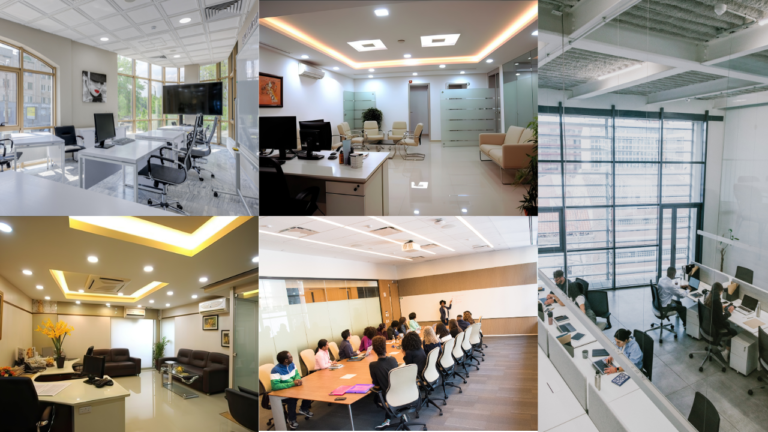How HVAC Impacts Comfort and Productivity in Co-Working Spaces
Introduction
Co-working spaces have become a popular choice for freelancers, startups, remote employees, and small businesses. These flexible work environments are designed to foster creativity, collaboration, and productivity. However, one often-overlooked aspect that significantly influences user experience is the heating, ventilation, and air conditioning (HVAC) system.
A well-designed HVAC system ensures temperature regulation and improved air quality, energy efficiency, and user well-being — all crucial factors in enhancing comfort and productivity. Here’s how HVAC impacts co-working spaces and why it should be a top priority for operators and designers.

1. Enhances Thermal Comfort for Diverse Users
- Co-working spaces host people from various backgrounds with different thermal preferences. While one person may prefer a cooler room, another may feel more comfortable at a warmer temperature.
- HVAC systems allow for precise temperature control to cater to a wide range of preferences.
- Features like zoned HVAC systems enable temperature customization in different sections of the workspace, ensuring everyone feels comfortable, whether they’re in a meeting room or a quiet zone.
- Maintaining a stable and pleasant indoor climate can reduce distractions and physical discomfort, allowing people to focus better on their work.
2. Improves Indoor Air Quality (IAQ)
- Good indoor air quality is critical in shared work environments where multiple people work nearby.
- HVAC systems with HEPA filters, UV light purifiers, or ionizers can remove harmful airborne particles, bacteria, and allergens.
- Proper ventilation ensures that fresh outdoor air replaces stale indoor air, preventing the buildup of carbon dioxide (CO₂), volatile organic compounds (VOCs), and other pollutants.
- Better IAQ leads to improved cognitive performance, fewer health complaints, and a more energized workforce.
3. Reduces Sick Building Syndrome (SBS)
- Sick Building Syndrome refers to a set of symptoms experienced by occupants due to poor air quality, temperature fluctuations, and inadequate ventilation.
- Symptoms can include headaches, eye irritation, fatigue, and respiratory issues — all of which affect comfort and work efficiency.
- A properly designed and regularly maintained HVAC system can eliminate sources of SBS, including Mold growth, airborne bacteria, and inconsistent temperatures.
- This promotes a healthier indoor environment, reducing absenteeism and increasing overall satisfaction among tenants.
4. Enhances Focus and Productivity
- Research shows that temperature and air quality have a direct impact on cognitive functions like concentration, memory, and problem-solving.
- A comfortable temperature range (typically between 21–23°C or 69–74°F) helps maintain focus and mental clarity.
- HVAC systems with quiet operation prevent distracting noises often found in older or poorly maintained systems.
- Consistent airflow and a balanced climate can help employees remain alert and productive throughout the day.
5. Supports Smart Building Integration
- Modern co-working spaces are often part of smart buildings with IoT-based automation and energy control.
- Advanced HVAC systems can be integrated with occupancy sensors and smart thermostats to adjust temperature and airflow based on real-time usage.
- This not only improves user experience but also helps reduce energy consumption during off-peak hours.
- Remote access and automation make HVAC management easier for facility managers, allowing quick adjustments and real-time monitoring.
6. Encourages Longer Occupancy and Retention
- Comfortable and healthy work environments encourage members to spend more time in the workspace.
- Over time, the experience of a pleasant indoor environment influences people’s decision to renew memberships or refer the space to others.
- Consistent HVAC performance creates a reliable work atmosphere, increasing the likelihood of long-term engagement and brand loyalty.
- Co-working space providers benefit from higher occupancy rates and better user satisfaction.
7. Energy Efficiency and Sustainability
- With growing concerns about environmental impact, energy efficiency is a key factor for modern buildings.
- HVAC systems account for a significant portion of energy usage in commercial spaces. Investing in energy-efficient HVAC units can drastically reduce electricity bills.
- Features like inverter technology, variable-speed compressors, and energy recovery ventilators (ERVs) help reduce waste and improve system efficiency.
- Alviz Electro India Pvt. Ltd. offers sustainable HVAC solutions that align with green building certifications like LEED, making co-working spaces environmentally responsible.
Conclusion
HVAC systems are more than just about heating and cooling — they are vital to the comfort, health, and productivity of individuals in a shared workspace. From improving air quality to enabling energy-efficient operations, a well-maintained HVAC system adds immense value to co-working environments.
At Alviz Electro India Pvt. Ltd., we specialize in delivering cutting-edge, energy-efficient, and customized HVAC solutions for co-working spaces of all sizes. Let us help you create a space where people love to work — comfortably, safely, and productively.
Disclaimer:
The blog posts on alviz.in are for informational purposes only. While we aim for accuracy, the content may not reflect the latest updates or specific advice. Alviz Electro India Pvt. Ltd. is not responsible for actions taken based on this information. For expert guidance, please contact us.